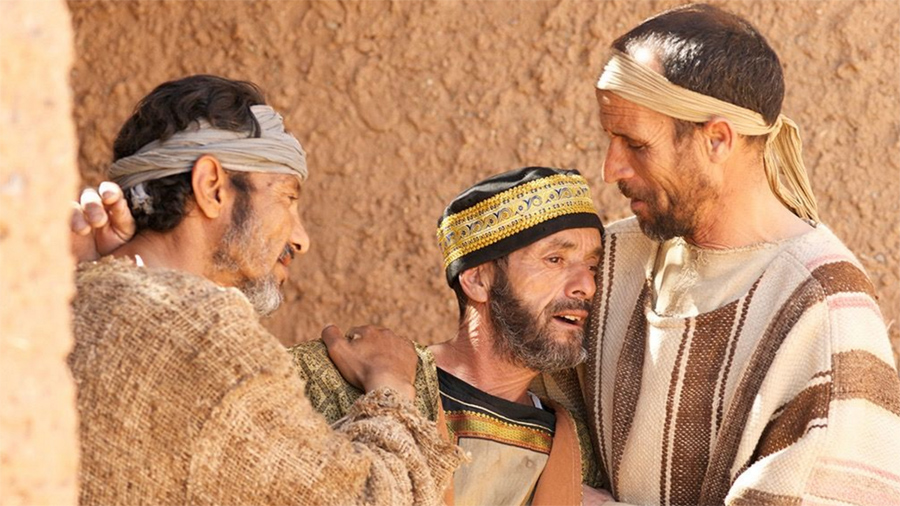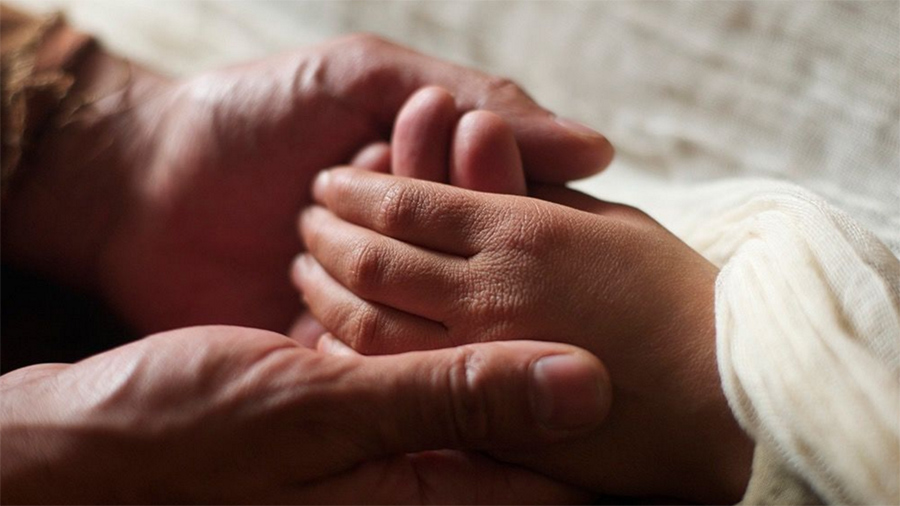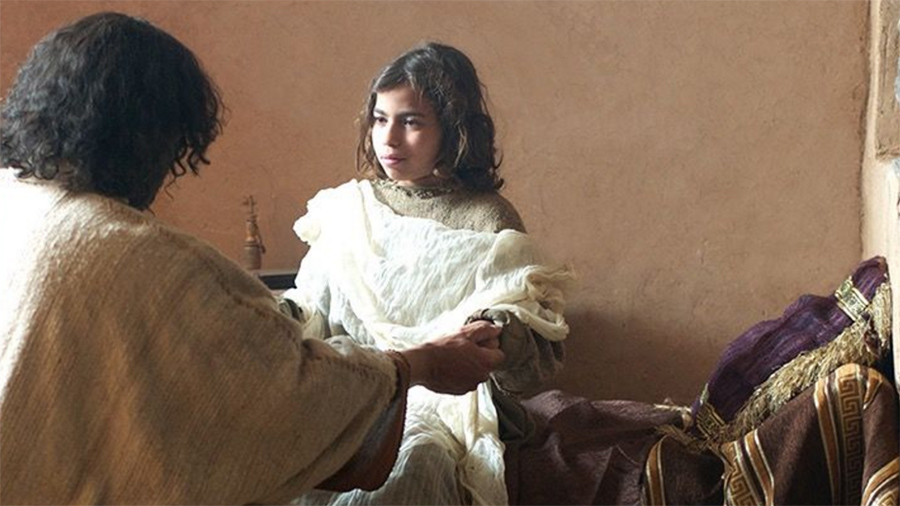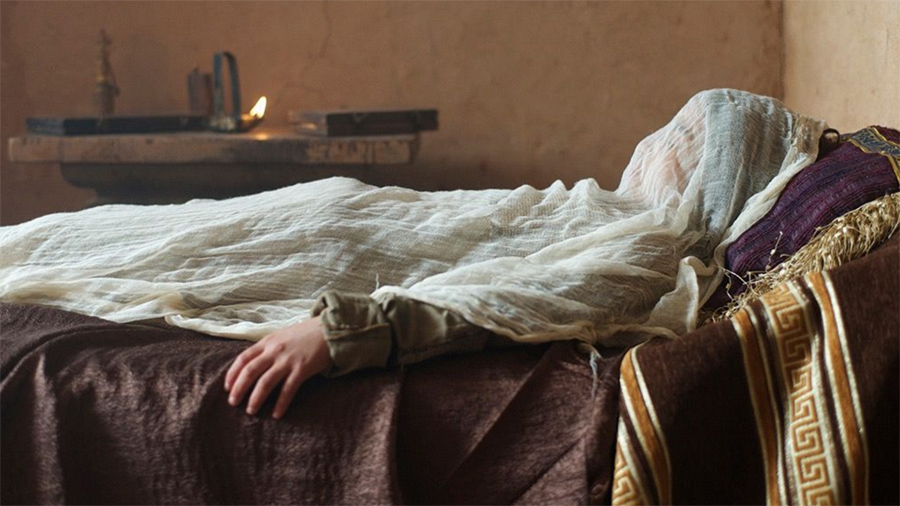[Jesus promised] “Very truly I tell you, whoever hears my word and believes him who sent me has eternal life and will not be judged but has crossed over from death to life. Very truly I tell you, a time is coming and has now come when the dead will hear the voice of the Son of God and those who hear will live (John 5:24—25).
Reflection:
Jesus’ words, “Talitha koum!” were simple: “Little girl, I say to you, get up.” They were just what a parent might say trying to nudge a daughter awake in the morning in time to get breakfast and get to school. Jesus’ next words were equally simple, “Give her something to eat.” Almost exactly what someone might expect after a little girl had awakened to begin her busy day — after all, breakfast after a good night of sleep is the most important meal of the day!
Simple words!
Except…
This little girl was dead at the age of 12 years old. The dad had come to Jesus for help. Jesus’ trip to come and help his little girl had been interrupted by an older woman. Yes, this older woman had deep needs, but this was his daughter, and her life was at stake. Death was closing in on a family about to lose a child, about to face an unspeakably unfair horror. By the time Jesus had helped the older woman, word had begun to spread that Jesus didn’t need to trouble himself to come and help the little girl. She had died. It was too late. She was gone. Her family was devastated. The neighbors were mourning (Mark 5:21-43).
“The child is not dead but asleep.” The mourners laughed at these words of Jesus. They knew better. They knew death. Dead people don’t rise from the dead. Dead people stay dead. The broken-hearted left behind are never fully mended.

Except…
Jesus “ruined” every funeral he attended. He was about to quietly “ruin” this one using simple words of authority and grace.
We gather around the Table of the Lord on the first day of the week just as the first Christians did nearly 2,000 years ago. We often call it Communion. We share a very simple meal of bread and wine; yet in the hands of Jesus, this simple meal is not so simple: this meal is something "beyond bread and wine.” There is more than just flat bread and grape juice as we take this simple meal. Just as Jesus’ words to the girl were simple, yet so much more than anyone could imagine, so also is this bread and wine.
Jesus told us to take and eat this simple bread and drink this simple wine. That we still do today is a reminder that something profound happened. Jesus died. His body was abused — whipped, torn, thorn-pierced, and punctured by nails and spear. That battered body bled. That body died. That body was buried.
However, like that little girl’s body that had died, Jesus’ body didn’t stay dead. In dying, Jesus defeated death, hell, and sin. Then, on the first day of the week, on Sunday, Jesus got up. He got something to eat. He changed everything for us just as he changed everything for Jairus and his family. Death is no longer something we must fear, but it is sleeping yet still alive in Jesus, waiting until the Lord says to us, “Get up!” (1 Thessalonians 4:13-18; Philippians 1:19-24).
What we eat from this table is simple: bread and wine (Matthew 26:26).
When we eat is on the day of Jesus’ victory, not the day of his defeat: life and love triumph over sin, death, and hell (Acts 20:7; 1 Corinthians 15:50-58).
Why we eat is to remember that death does not hold us, hell cannot have us, and sin will not destroy us (Hebrews 2:14-18).

Jairus’ little girl, this bread, this wine, and this day coalesce to remind us. They help us remember that Jesus’ death was not in vain. Our lives are not lived in vain. Death may appear to mock us, but we are all headed to a rendezvous with Jesus’ future for us. This future is based on what is simple — simple words and a simple meal — yet what is simple is leading us to a glory beyond anything we can imagine (Romans 8:18).
Prayer for the Bread:
Precious God, our Almighty, and our Abba Father, thank you for what is simple… this bread, this wine, and this day to remember. May this simple bread stir our hearts to believe that our future is sure, our hope is certain, and our graves will not hold us because of Jesus’ death, burial, and resurrection. We thank you, in his name and because of his sacrifice. Amen.
Prayer for the Cup:
Father, as we take this cup, we remember the blood that was shed as a sin offering for our sin. While we are saddened at the cost, we are overjoyed at the future that this gift has brought to us. Thank you! In Jesus’ name, we praise you and thank you for such great love. Amen.

Special thanks for the use of images related to Jesus' ministry from The Lumo Project and Free Bible Images.










Reader Comments
Archived Facebook Comments